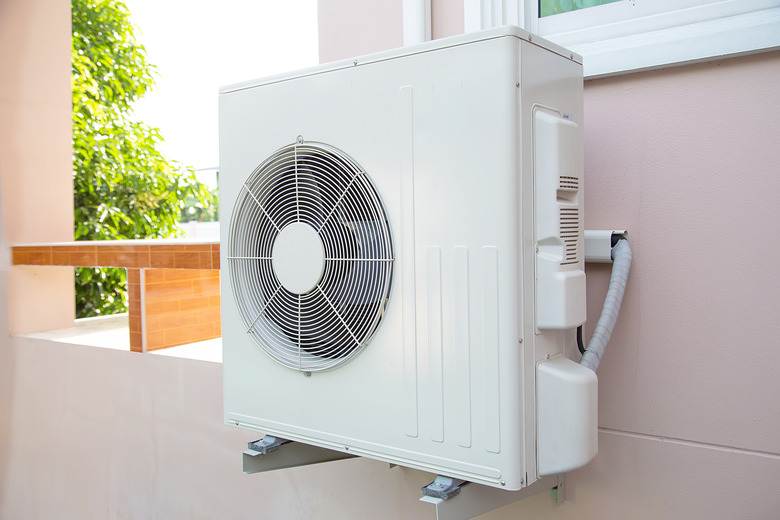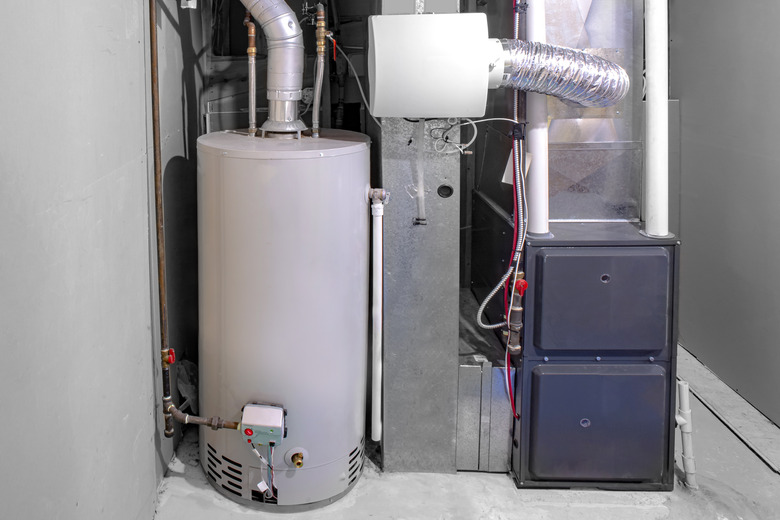Heat Pump Or Furnace: Which Is Best For Your Home?
We may receive a commission on purchases made from links.
When it comes time to replace an old gas or electric furnace, you will need to make an important decision: stick with a furnace, or switch to a heat pump. Heat pumps are touted as energy-efficient marvels, but any new gas furnace will certainly be more energy efficient and better at heating your home than the one it replaces.
Close to 90 percent of the households in the U.S. use either natural gas or electricity to power their heating system, and most of them are forced-air systems, where the furnace heats the air and ducts carry it throughout the house. There are pros and cons to both of them, however, and it all comes down to choosing what's particularly best for your own home and the environment (and climate) in which you live.
Tip
The choice between a heat pump and a furnace may depend on whether long-term savings or upfront costs are the determining factor for you — or what option is the most environmentally friendly. However, there is also more to the decision than picking the "greenest" product. Other factors for homeowners to consider are installation difficulty, the condition of your current forced-air system and even where you live.
The Basic Differences Between Heat Pumps and Furnaces
The Basic Differences Between Heat Pumps and Furnaces
As far as energy consumption goes, a heat pump is designed to deliver 1 1/2 to three times more heat energy than the electricity it consumes — so it is absolutely more energy efficient than any gas furnace. In most cases, standard furnace units convert about 80 to 85 percent of the fuel they consume to heat, and the rest is lost up the chimney. High-efficiency models, however, are able to extract more heat from the flue gases, resulting in more efficient units.
Another basic difference is that heat pumps provide a heating and cooling system in a single unit as opposed to a furnace, which does not cool a home. There are a few different types of heat pumps, including air-source heat pumps (ASHP), geothermal heat pumps and water-source heat pumps. Air-source heat pumps are the most popular because they are the easiest to install, and there is a familiarity factor: The components resemble a central air-conditioning system. There are also heat pump minisplit systems that have an outside condenser just like the ducted heat pumps, but the tubing is connected to individual room units. These systems are ductless, and there is no central air handling unit.
As for how the units actually work, a furnace produces heat whereas a heat pump transfers heat. In heating mode, a condenser located outside extracts heat from the air and transfers the heat energy to coils filled with refrigerant. The heat is released inside the house in an air handler that contains a blower like in a furnace system. From there, the heated air circulates through ductwork. In summer, the process is reversed as the units draw heat from inside the house and release it outside.
Comfort-wise, many people who are familiar with the blast of hot air from a gas furnace may think that a heat pump air blows cooler. However, on the other hand, heated air from a gas or electric furnace is very dry, whereas heat pump air contains some humidity and won't dry out your skin as much.
If your heating system needs to replaced and you're determining which type of unit to choose, it's important to consider your current setup. If you need a new furnace and do not have an air conditioner, a heat pump can provide both. If there is already a central air system in place, it may not be cost-effective to install a heat pump, which will be more expensive than installing a furnace.
Comparing Energy Costs for Heat Pumps and Furnaces
Comparing Energy Costs for Heat Pumps and Furnaces
Because it provides both heating and cooling, the energy efficiency of a heat pump is measured in two ways. Home heating efficiency is measured by the heating season performance factor (HSPF), which is the season's heating produced in Btu (British thermal units) divided by the energy consumed. The minimum HSPF allowed is 8.2, but the most efficient heat pumps are in the 10 to 13 HSPF range.
Cooling efficiency is measured by the seasonal energy efficient ratio (SEER), which is the heat removed during the cooling season divided by the energy consumed. The minimum is a SEER of 14, but the most efficient can be around SEER 20.
Tip
These standards will change in 2023. The minimum HSPF will rise to 8.8. The minimum SEER of 14 will remain for units sold in the northern part of the United States but will rise to 15 for those sold in southern regions, where cooling accounts for more of the energy load.
The efficiency of a gas furnace is measured by its annual fuel utilization efficiency (AFUE), or how much of the energy consumed is converted into heat. The minimum is 80 percent, but the most efficient furnaces can achieve 98 percent efficiency.
The type of unit you choose is only one factor in how much you will pay for heating. While a furnace may not be as energy efficient as a heat pump, other factors can help make it more attractive. Beefing up the home's total energy package that includes insulation levels, types of windows, condition of the caulk around windows and doors and the like also reduce energy costs, which could make a furnace, especially a high-efficiency one, more attractive.
Stuck on which to choose? Consider the average heating costs for a heating season:
- Air source heat pump: $500
- Gas furnace: $850
- Electric resistance furnace: $900
Climate — and Heat Pump Efficiency
Climate — and Heat Pump Efficiency
The conventional wisdom on heat pumps is that they are great for homes in warm and temperate climates, but they lose their energy-saving advantage in cold climates. Because heat pumps extract heat from the outside air, as the temperature drops, the system has to work harder to obtain the heat energy. Most standard models become ineffective when the temperature drops to between 25 and 40 degrees Fahrenheit. At that point, an auxiliary heat source, like a furnace, has to provide the needed heat.
Standard units can also be hindered by ice accumulation on the coils. As the unit removes heat from the air, the moisture in the air condenses and freezes on the coils.
The heat pump market has addressed these drawbacks in a number of ways, including combining a heat pump with another heat source, typically a conventional furnace. (Some manufacturers sell these as dual-fuel systems.) There will be tradeoffs with this type of system in very cold climates, however. The more days a furnace has to take up the heating slack, the less net energy savings there will be. It's important to discuss this with a qualified contractor because a high-efficiency furnace may be a better choice in areas with very cold winters.
There have also been technological advances that make heat pump systems more efficient in cold weather, including improved coil designs, multispeed compressors and the use of a defrost cycle. Manufacturers use different defrost mechanisms. One is to reverse the heat flow and take heat from the house to clear the coils. Another uses a hot refrigerant line to circulate through the outdoor unit to prevent freezing.
Heating System Costs for Heat Pumps and Furnaces
Heating System Costs for Heat Pumps and Furnaces
Heat pumps are full-stop more expensive than furnaces, and you can expect to pay $4,000 to $8,000 to for heat pump installation costs. A furnace will range from $1,500 to $2,500 installed, although some high-efficiency models are double that price (and this is also assuming that the ductwork throughout the house is in good condition).
Expect to also pay more for heat pump repairs because they are more complicated than a standard furnace. While heat pumps are becoming more popular, they only account for about 11 percent of the market. Many HVAC contractors may not be familiar with the technology, so finding one may be a problem, especially in cold climates where the units are not as popular as they are in warm climates.
As with the purchase of any big-ticket item, especially one that will affect your comfort and safety, it is best to consider all variables. Consult with a qualified contractor who can recommend the best system for your home.

